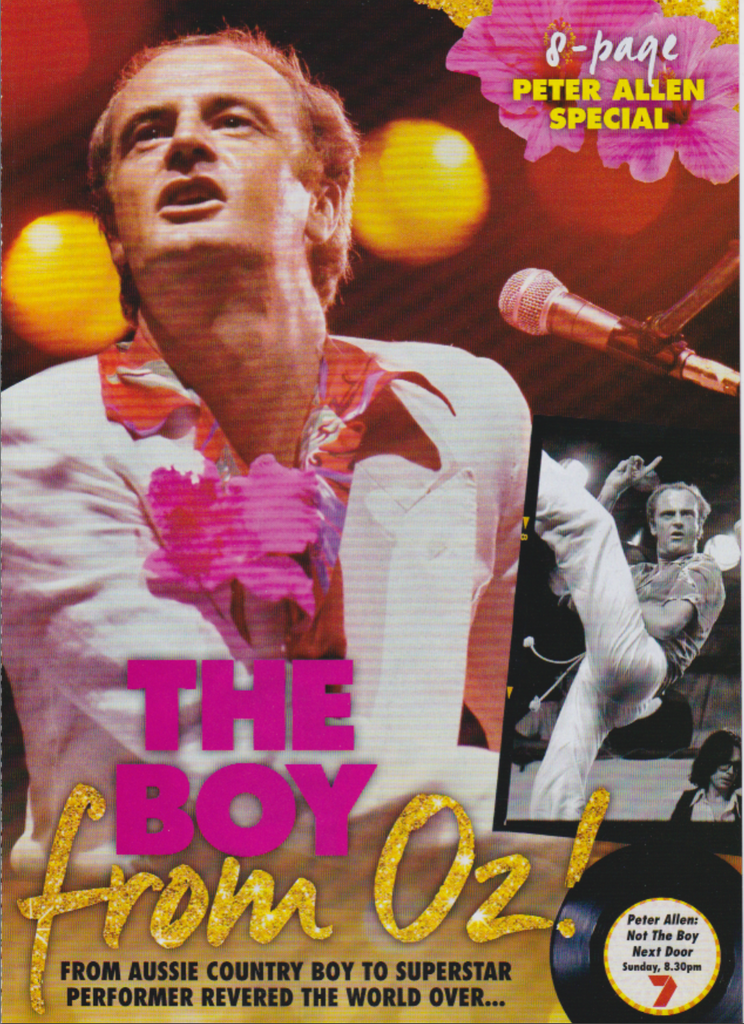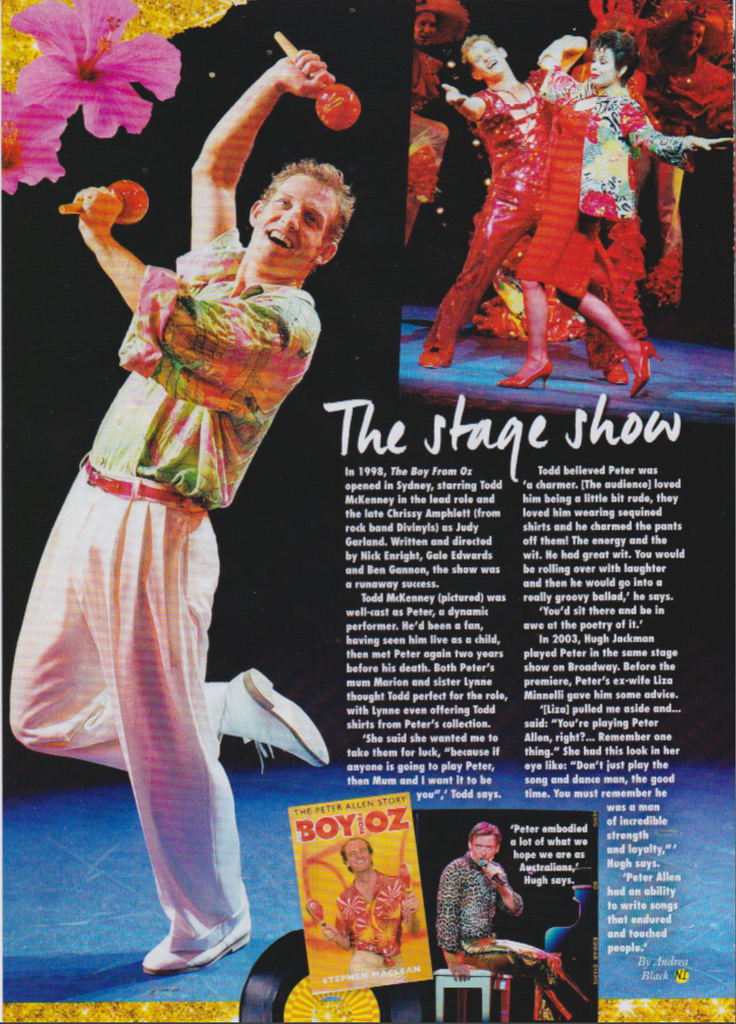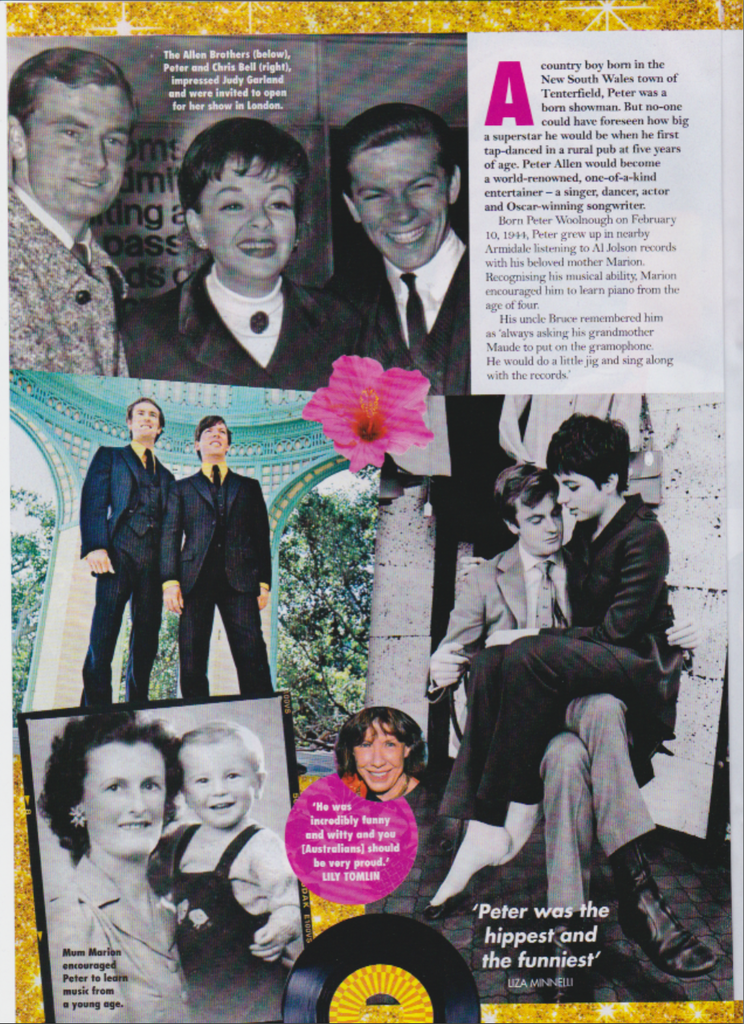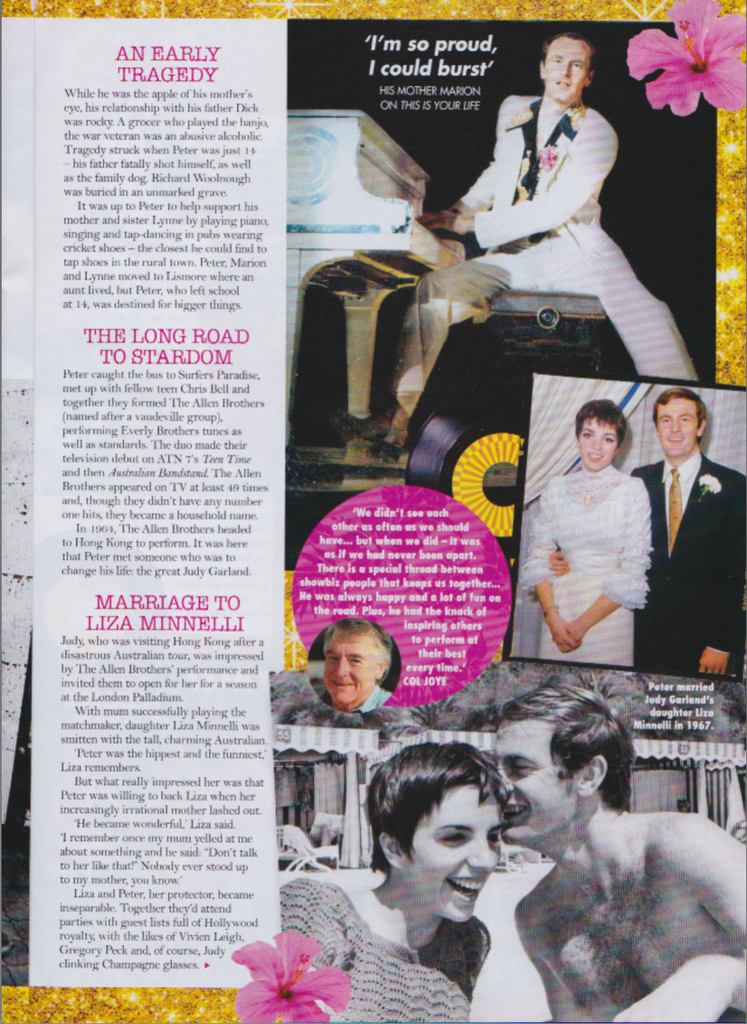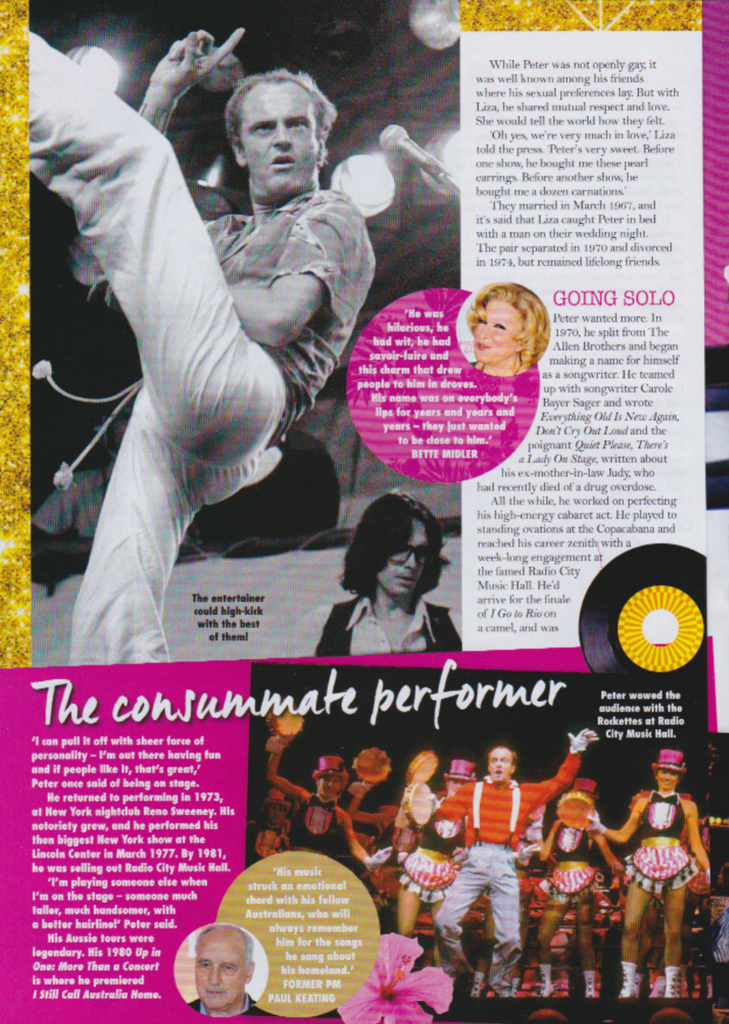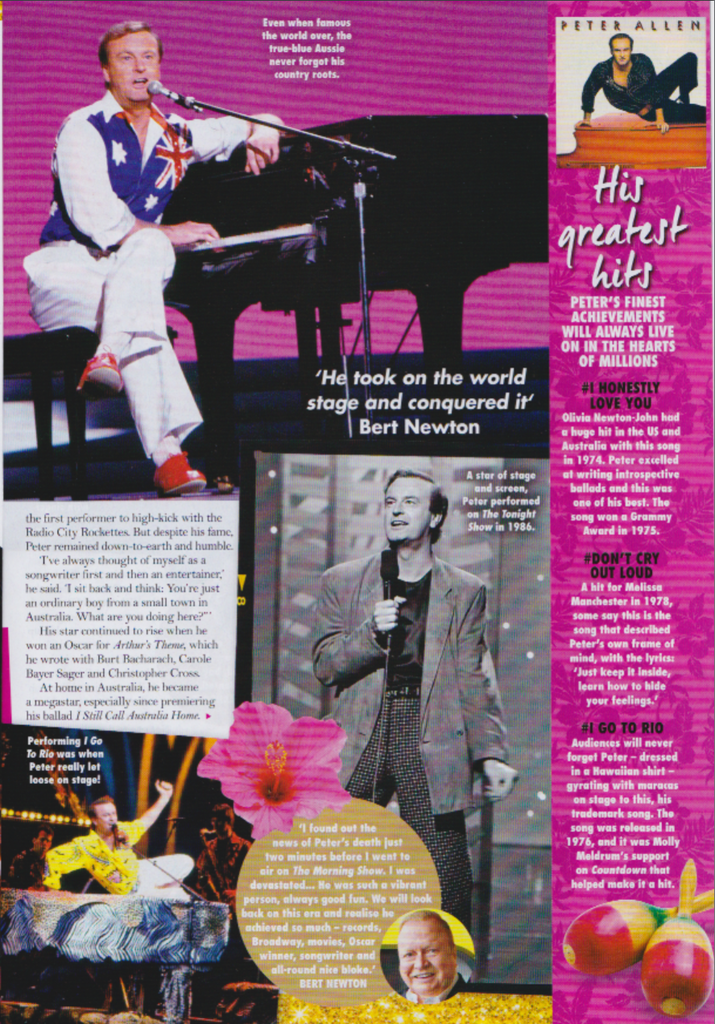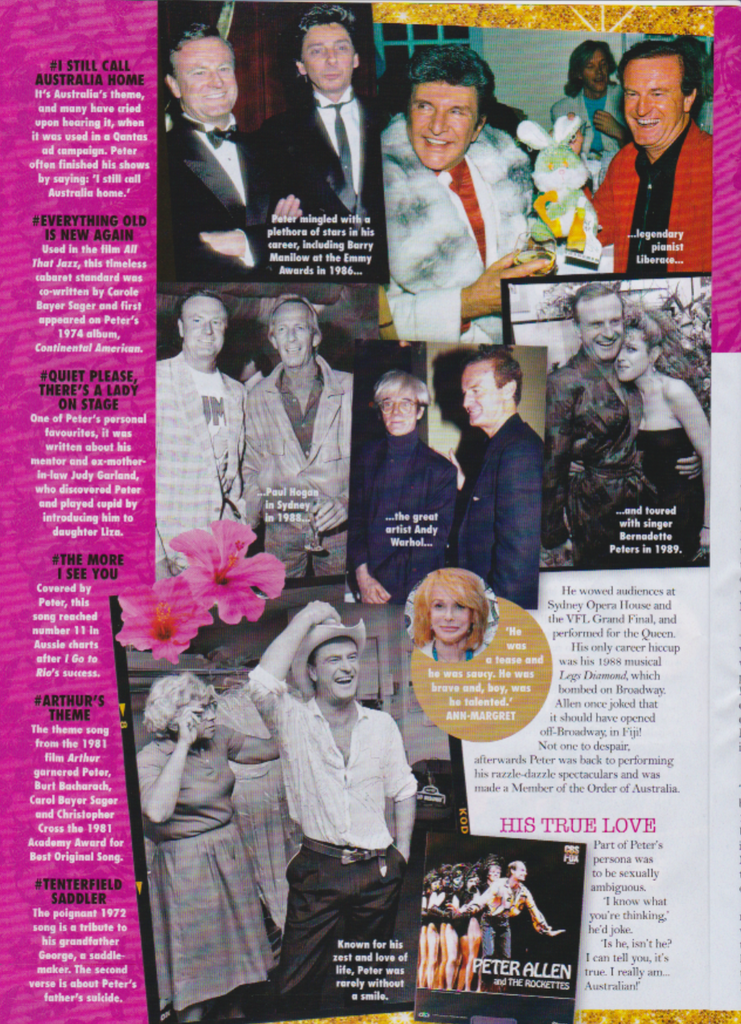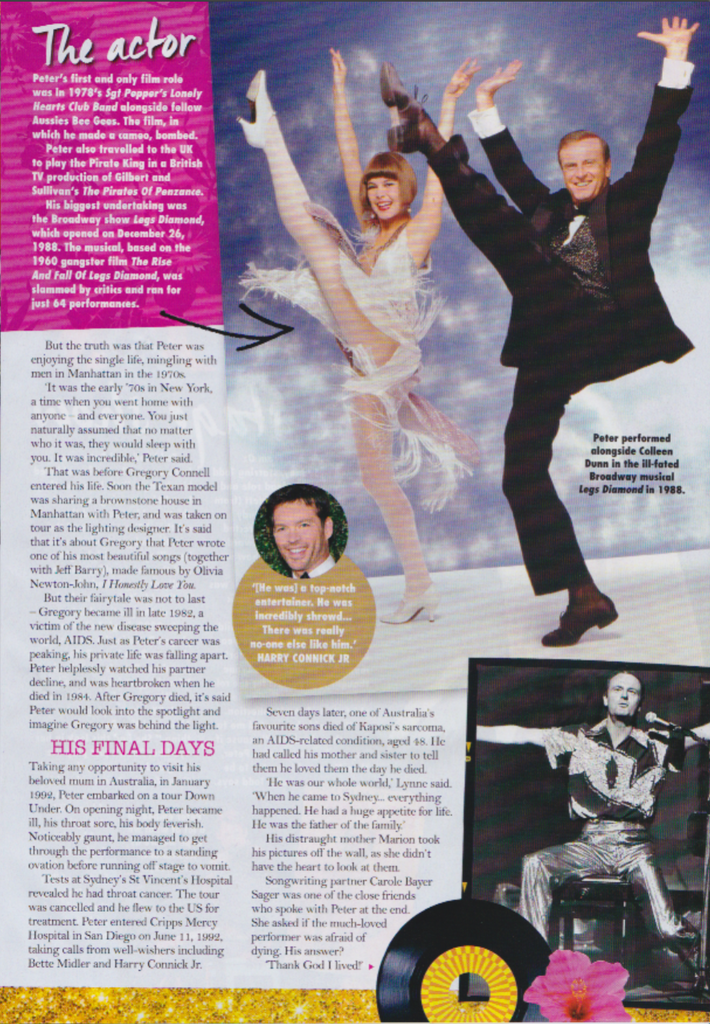Post by JH4HJ on Sept 13, 2015 18:25:42 GMT -5
Lot's of related material coming out with tangents to this TV bio-pic. Not much "news" here, but a reminder of the inspiration for some of Peter's most popular songs.
The surprising story behind Peter Allen’s songbook —
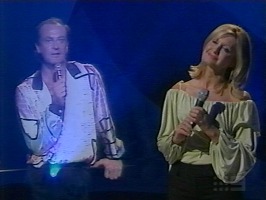
TENTERFIELD SADDLER (1972)
Peter Allen discovered his song-writing talents almost accidentally, bored doing covers and frustrated at other people having success with original music (like his then wife, Liza). But the breadth of his life experience and tragic family history would eventually see him make use of a great Woolnough tradition of storytelling. This autobiographical hit is imbued with such pathos, paying homage to Allen’s grandfather George Woolnough, Allen’s father Dick (who committed suicide when Peter was just 13) and the different turns his life would take, in comparison to theirs. “He’d almost forgotten them both because in this life that he leads, there’s nowhere for George and his library, or a son with a gun, to belong…except in this song.” Introducing the song to audiences, after years of performing more upbeat covers, he said: “there’s this whole other (side) to me than just the shakin’. He’s not that much fun, but he is there and we have to acknowledge him - the sensitive songwriter, something like John Denver, you know the type.” Renowned songwriter Carole Bayer Sager, who worked with Allen over many years, took his talents seriously: “though a lot of people will always think of Peter as this extraordinary showman and this amazing entertainer, to me that came second to what I think his soul was really about (song-writing).”

I HONESTLY LOVE YOU (1975)
His success as a songwriter would set Allen up financially, affording him homes in New York and California, with a beach house on the north Queensland coast. One of his most lucrative tracks was a hit he co-wrote with Jeff Barry for another Australian, Olivia Newton John, who launched her international career with I Honestly Love You. Performing it for the first time in a New York club, Reno Sweeney’s, Allen recalled, in Stephen MacLean’s biography, The Boy from Oz, that the song’s impact was immediate: “everything stopped. Even the waiters stopped. The air was still and when I finished you could have heard a pin drop. Then they began to applaud and the applause rolled on and on.” He loved the Aussie connection too, telling fans: “Olivia recording my song meant an awful lot to me…around thirty grand actually.” In the telemovie, Allen (Jackson) buys his mother her apartment in Bondi and when she thanks him, he replies: “don’t thank me, thank Olivia.” But the song wasn’t to everybody’s taste, with singer Minnie Ripperton unkindly dismissing the recording as “Australia’s gift to insomniacs.”

I GO TO RIO (1976)
THE song which really put Allen on the international map – and shaped his maraca-shaking image – grew out of his love for MGM musicals. “I saw all those old Betty Grable musicals, where they are always going to South America, and I remembered that Rio seemed to be the most glamorous place on earth,” he said to MacLean. In another TV interview, Allen told chat show host Bill Boggs, the song – co-written with Adrienne Anderson, a New York lyricist based in San Francisco - almost went in a different direction. “I had an old ballad and I thought ‘that’s boring’ so I played it faster and faster until it got some place that I liked it. Adrienne had written some stuff with Barry Manilow, so I said it was lucky I had this melody. We started and I was thinking (lyrics) ‘I could love you if you’d leave your husband’ and she said, ‘no, you’re always writing that – why don’t you write something that’s just positive and up, like ‘when my baby smiles at me I go to…’ So (plays piano) ‘when my baby smiles at me I go to…heaven…? No, heaven’s no good. So for 10 minutes we were trying to find a place to go. And then I just said, ‘Rio.’ And she said, ‘Rio?’ and I said, ‘De Janiero,’ and she said ‘oh, alright then.’ And we wrote the song real quick.” It appeared on his fourth studio album, Taught By Experts and was number one in Australia for five weeks.

I STILL CALL AUSTRALIA HOME (1980)
JUST thirty minutes - that’s how long it took Allen to finalise the lyrics and melody to a song which would endure as his most lasting legacy and Australia’s unofficial anthem. But that was the genius of the song-and-dance man. Touring his successful Broadway show, Up In One (a stage direction, referring to the area closest to the audience) Allen often bantered with his fans that ‘no matter how far, or how wide I roam, I still call Australia home.’ A record executive heard it, and encouraged him to make something of the sentiment. So when it came time to record his next album, Bi-Coastal (another deliciously ambiguous nod to his sexuality, but also his travels between New York and Los Angeles), Allen penned the lyrics to what would be I Still Call Australia Home. With just 24 hours to record it in time, he used the half-hour intermission backstage to pull the song together, performing it for the first time on the final night of the tour in Melbourne. It was received so well, he insisted it be included on his next compilation album, The Best Of Peter Allen. And some would say it was just that.

ARTHUR'S THEME (1982)
HIS Oscars moment – winning the 1982 best song gong for co-writing the theme from the Dudley Moore movie, Arthur (Best That You Can Do) – almost wasn’t, after attempts were made to buy him out of the accolade. Going on previous form, studio executives were convinced only one name should be put forward for the Academy Award, rather than the song’s four authors, which included Burt Bacharach, his then wife Carole Bayer Sager and singer Christopher Cross. Offered up to $50,000 to “buy out” of the credits, Allen stood his ground and refused to withdraw his name from the entry. The competition was strong, especially from Lionel Richie’s classic ballad Endless Love and the James Bond theme, For Your Eyes Only; but despite all predictions, Allen and his cohorts prevailed, each receiving a golden statue from presenter, Bette Midler. In his acceptance speech, Allen thanked an unknown air traffic controller for putting a flight he was on in a holding pattern – the inspiration for the song’s chorus: “when you get caught between the moon and New York City, the best that you can do is fall in love.”
A bit more info, photos, and a few links here.
The surprising story behind Peter Allen’s songbook —

TENTERFIELD SADDLER (1972)
Peter Allen discovered his song-writing talents almost accidentally, bored doing covers and frustrated at other people having success with original music (like his then wife, Liza). But the breadth of his life experience and tragic family history would eventually see him make use of a great Woolnough tradition of storytelling. This autobiographical hit is imbued with such pathos, paying homage to Allen’s grandfather George Woolnough, Allen’s father Dick (who committed suicide when Peter was just 13) and the different turns his life would take, in comparison to theirs. “He’d almost forgotten them both because in this life that he leads, there’s nowhere for George and his library, or a son with a gun, to belong…except in this song.” Introducing the song to audiences, after years of performing more upbeat covers, he said: “there’s this whole other (side) to me than just the shakin’. He’s not that much fun, but he is there and we have to acknowledge him - the sensitive songwriter, something like John Denver, you know the type.” Renowned songwriter Carole Bayer Sager, who worked with Allen over many years, took his talents seriously: “though a lot of people will always think of Peter as this extraordinary showman and this amazing entertainer, to me that came second to what I think his soul was really about (song-writing).”

I HONESTLY LOVE YOU (1975)
His success as a songwriter would set Allen up financially, affording him homes in New York and California, with a beach house on the north Queensland coast. One of his most lucrative tracks was a hit he co-wrote with Jeff Barry for another Australian, Olivia Newton John, who launched her international career with I Honestly Love You. Performing it for the first time in a New York club, Reno Sweeney’s, Allen recalled, in Stephen MacLean’s biography, The Boy from Oz, that the song’s impact was immediate: “everything stopped. Even the waiters stopped. The air was still and when I finished you could have heard a pin drop. Then they began to applaud and the applause rolled on and on.” He loved the Aussie connection too, telling fans: “Olivia recording my song meant an awful lot to me…around thirty grand actually.” In the telemovie, Allen (Jackson) buys his mother her apartment in Bondi and when she thanks him, he replies: “don’t thank me, thank Olivia.” But the song wasn’t to everybody’s taste, with singer Minnie Ripperton unkindly dismissing the recording as “Australia’s gift to insomniacs.”

I GO TO RIO (1976)
THE song which really put Allen on the international map – and shaped his maraca-shaking image – grew out of his love for MGM musicals. “I saw all those old Betty Grable musicals, where they are always going to South America, and I remembered that Rio seemed to be the most glamorous place on earth,” he said to MacLean. In another TV interview, Allen told chat show host Bill Boggs, the song – co-written with Adrienne Anderson, a New York lyricist based in San Francisco - almost went in a different direction. “I had an old ballad and I thought ‘that’s boring’ so I played it faster and faster until it got some place that I liked it. Adrienne had written some stuff with Barry Manilow, so I said it was lucky I had this melody. We started and I was thinking (lyrics) ‘I could love you if you’d leave your husband’ and she said, ‘no, you’re always writing that – why don’t you write something that’s just positive and up, like ‘when my baby smiles at me I go to…’ So (plays piano) ‘when my baby smiles at me I go to…heaven…? No, heaven’s no good. So for 10 minutes we were trying to find a place to go. And then I just said, ‘Rio.’ And she said, ‘Rio?’ and I said, ‘De Janiero,’ and she said ‘oh, alright then.’ And we wrote the song real quick.” It appeared on his fourth studio album, Taught By Experts and was number one in Australia for five weeks.

I STILL CALL AUSTRALIA HOME (1980)
JUST thirty minutes - that’s how long it took Allen to finalise the lyrics and melody to a song which would endure as his most lasting legacy and Australia’s unofficial anthem. But that was the genius of the song-and-dance man. Touring his successful Broadway show, Up In One (a stage direction, referring to the area closest to the audience) Allen often bantered with his fans that ‘no matter how far, or how wide I roam, I still call Australia home.’ A record executive heard it, and encouraged him to make something of the sentiment. So when it came time to record his next album, Bi-Coastal (another deliciously ambiguous nod to his sexuality, but also his travels between New York and Los Angeles), Allen penned the lyrics to what would be I Still Call Australia Home. With just 24 hours to record it in time, he used the half-hour intermission backstage to pull the song together, performing it for the first time on the final night of the tour in Melbourne. It was received so well, he insisted it be included on his next compilation album, The Best Of Peter Allen. And some would say it was just that.

ARTHUR'S THEME (1982)
HIS Oscars moment – winning the 1982 best song gong for co-writing the theme from the Dudley Moore movie, Arthur (Best That You Can Do) – almost wasn’t, after attempts were made to buy him out of the accolade. Going on previous form, studio executives were convinced only one name should be put forward for the Academy Award, rather than the song’s four authors, which included Burt Bacharach, his then wife Carole Bayer Sager and singer Christopher Cross. Offered up to $50,000 to “buy out” of the credits, Allen stood his ground and refused to withdraw his name from the entry. The competition was strong, especially from Lionel Richie’s classic ballad Endless Love and the James Bond theme, For Your Eyes Only; but despite all predictions, Allen and his cohorts prevailed, each receiving a golden statue from presenter, Bette Midler. In his acceptance speech, Allen thanked an unknown air traffic controller for putting a flight he was on in a holding pattern – the inspiration for the song’s chorus: “when you get caught between the moon and New York City, the best that you can do is fall in love.”
A bit more info, photos, and a few links here.



